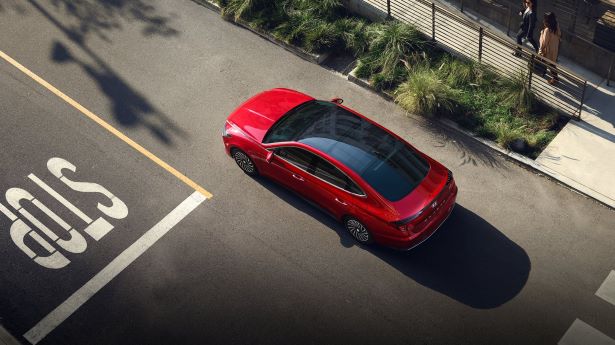
Hyundai Added Solar Panels To The New Sonata Hybrid
Solar panels have been available on production models of some plug-in hybrid cars since 2010 but how effective are they really? It’s not a new concept by any stretch of the imagination as the 2015 Toyota Prius and 2012 Fisker Karma had solar panels. More recent attempts include the Tesla Cybertruck and the 2020 Hyundai Sonata Hybrid.
In theory, solar panels on cars should generate enough free energy from the sun to power the engine and internal equipment. However, if all the math makes sense in terms of total vehicle weight and available solar power, why aren’t all vehicle manufacturers doing it? The answer comes partly from looking at the new Hyundai Sonata Hybrid Limited model, which comes with a solar panel roof.
Adding Solar Power To The Hyundai Sonata Hybrid
The new 2020 Hyundai Sonata Hybrid Limited model has a 205-watt solar panel engulfing the entire roof. According to Hyundai engineers, the solar panel can recharge the battery and increase driving range by about 3.5 km (2 miles) on a day with at least six hours of good sun.
During a recent test, it wasn’t clear whether the solar panels were working as the range indicator was the same in the morning and the evening. Whether the panel was collecting energy and diverting power to the air conditioning and radio, it wasn’t obvious at this point.
Perhaps it’s not the free mileage option many of us have been dreaming about which highlights something Elon Musk had said a few years ago, before launching the Cybertruck: “The least efficient place to put solar is on the car.”
The technology is certainly impressive but it doesn’t bode well for the future of “green-only” cars as many countries don’t have long periods of sunshine to rely on. For that reason, a hybrid car remains a smart choice for anyone who cares about the environment.
Is The 2020 Hyundai Sonata Hybrid A Good Car?
In short, the Hyundai Sonata Hybrid is a great car, especially in terms of range, which is 552 miles (890 km) on a full tank. It also has the same drag coefficient as a Toyota Prius which is 0.24 Cd. Adding to the fuel efficiency is the fact that the Sonata Hybrid looks sleek, modern and comes fitted with all the latest technology you’d come to expect from a hybrid car today.
So, what’s the verdict on the efficacy of the solar panels if they don’t clearly translate into free mileage? Well, it’s free energy whichever way you look at it and provides a trickle charge which will help keep the on-board batteries healthy. It also allows you to relax in a comfortable, luxurious cabin while the solar roof powers your laptop, tablet and any other connected device.
The fact that you can’t really drive your car using solar power is a good thing as it keeps us honest. If you consider how the coronavirus has impacted our world, travelling unnecessarily has become a thing of the past. Solar panels on a car seem like a challenge to see how long you can go without driving. If you are more deliberate in planning your route, the more efficient you will be.
Hyundai has long been a manufacturer of exceptional cars and wouldn’t waste time and money on something that won’t work or that appears unnecessary. According to the company, the solar panels are a “unique design cue” which “delivers differentiation.” While you can’t rely on these solar panels to power your journey, it certainly adds to the overall design and reminds us that driving is not free.
Whether solar panels on cars are the answer or not, it certainly makes you think about how much fossil fuel (and sunlight) is required to get you from point A to point B, and that we should behave accordingly.
If you liked reading this, follow our blog for more interesting articles covering the latest developments in the motoring world. There is no indication whether the Hyundai Sonata Hybrid will come to South Africa but we have many other magnificent cars to choose from in our Digital Showroom.

